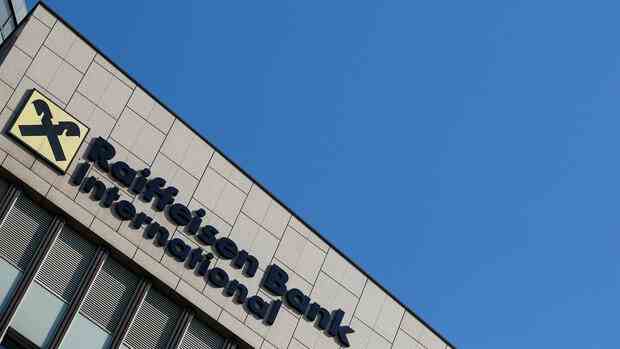In the final quarter, the bank more than doubled its net profit to EUR 826 million.
(Photo: Reuters)
Vienna Thanks in part to its Russian business, Raiffeisen Bank International (RBI) more than doubled its net profit in the past financial year. The bottom line is that the result rose to 3.63 billion euros after 1.37 billion euros, as the Vienna-based institute announced on Tuesday evening. This should also benefit the shareholders, who had recently gone away empty-handed.
For 2022, the board will recommend a dividend of up to 80 cents per share, it said. However, the date of the decision is still open and will probably not be made at the general meeting at the end of March, the group said. The distribution depends on the capital ratios and ongoing strategic considerations.
The bank still left open a decision about the future of the Russian business. In the past eleven months, the evaluation of all strategic options has been promoted, said bank boss Johann Strobl. “When we announced this assessment, we understood that this process would take time. When carrying out our valuation, we are moving in a hitherto unknown, complex market environment. This includes constantly changing legal and regulatory requirements,” says the manager.
According to the RBI, profits from Russia and Belarus cannot currently be distributed. Without Russia and Belarus and a sale, a group profit of 982 million euros was achieved, an increase of 35 percent. “This result shows that RBI continues to generate high profits across the group,” said Strobl. The profitability of the business in Austria and in Central and Southeastern Europe remains robust.
In the final quarter, net profit more than doubled to 826 million euros. With the result, RBI is well above the expectations of analysts, who, according to a survey by the bank, had expected an average profit of 657 million euros. Net interest income rose sharply, climbing to EUR 5.05 billion from EUR 3.33 billion previously due to higher interest rates. Without Russia and Belarus, the value would have increased by 37 percent to 3.4 billion euros.
Plus even without Russia and Belarus
The bank increased net commission income to EUR 3.88 billion after EUR 1.99 billion. Without Russia and Belarus it would be an increase of 16 percent to 1.74 billion euros. The common equity tier 1 ratio (CET1) jumped to 16 percent after 13.1 percent at the end of 2021. RBI wants to remain above 15 percent in the current year.
The RBI had to set aside far more for bad loans last year. The risk costs would have more than tripled to 949 million euros. 490 million euros were incurred in Belarus and Russia alone, it said.
For 2023, the bank has also set itself goals without Russia and Belarus. For example, the hard core capital ratio without the two countries should be 13.5 percent. Net interest income is expected to be between EUR 3.2 billion and EUR 3.4 billion, and net commission income around EUR 1.6 billion. Including the two countries, however, the bank expects net interest income of up to 4.7 billion euros and net commission income of up to 2.5 billion euros.
More: “Just as tough as sensitive” – This is how the new chairman of the supervisory board of Deutsche Bank puts on
